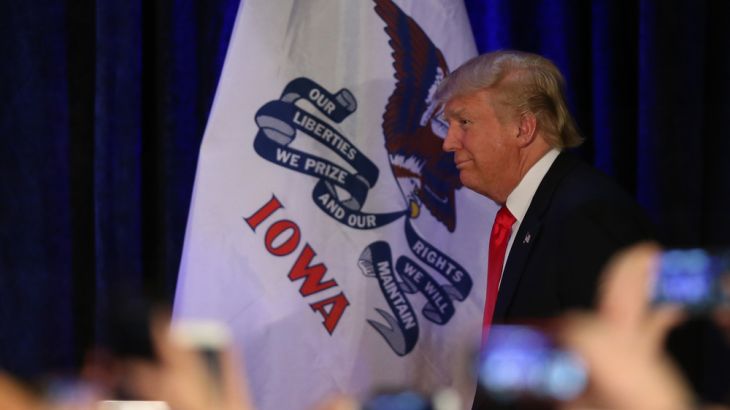
What happened in Iowa: Bursting the US media bubble
The White House race – candidates the media like to cover and those the people vote for. Plus, Venezuela’s media battle.
After months of breathless build-up, anticipation and analysis, the race for the White House officially began with the Iowa caucuses last week. The results told us as much about the media as they did about the politics.
Donald Trump, a candidate whose soundbites dominated the pre-caucus coverage, came second after leading almost every opinion poll and trouncing his Republican opponents when it came to media exposure.
Keep reading
list of 4 itemsNPR editor resigns after accusing US outlet of liberal bias
Lawmakers brawl as Georgian Parliament considers ‘foreign agent’ bill
Journalist loses foot after being badly wounded in Israeli attack in Gaza
Bernie Sanders forced a photo finish with Hillary Clinton despite long-accepted assumptions among many in the media that the former first lady is the Democratic heir apparent.
What does this say about how journalists have covered the campaign and the candidates so far?
We spoke to: James Warren, the chief media correspondent at Poynter Institute; Zaid Jilani, a reporter at The Intercept; Hadas Gold, a media reporter at Politico; and Associate Professor at Penn State College of Communications, Russell Frank.
Other stories on our radar this week: An official report by the United Nations panel rules that the WikiLeaks founder Julian Assange has been ‘arbitrarily detained’ and should be freed immediately, as well as compensated; in Afghanistan, another journalist has been killed by unknown assailants in the eastern province of Nangarhar; and in Moscow, a magazine critical of the Kremlin is facing severe fines after publishing a story on the private life and wealth of Vladimir Putin’s daughter.
Stop the press: Venezuela’s media battle
How can a newspaper cover stories without paper?
That’s a dilemma faced by newspapers in Venezuela – at least those who are opposed to the government of Nicolas Maduro.
Government control of paper imports means that it is the state who can judge what news is fit to print. The opposition calls it a form of media censorship.
The Listening Post‘s Marcela Pizarro takes a look at the politics of paper and populism in the Venezuelan news media.
Finally, observing the US presidential campaign from not too far away, Canada would like to teach it’s unruly southern neighbour a thing or two about how to run a country. That’s the view of Canadian comedian Brian Calvert and his American colleague Chris Cannon whose “America But Better” campaign is a pitch for Canada (yes, the whole country) as US president. Republicans and Democrats across the border may not agree with the message of this video but at least one Canadian – the host of The Listening Post – approves.